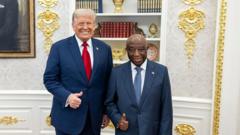Netanyahu's gesture of nominating Trump for the Nobel Peace Prize symbolizes a shift in diplomatic strategies where leaders employ flattery to engage with the American president, raising questions about long-term implications.
Flattery Politics: Netanyahu Nominates Trump for Nobel Prize

Flattery Politics: Netanyahu Nominates Trump for Nobel Prize
Israeli Prime Minister seeks to ingratiate with Trump amidst global diplomacy.
In an unexpected display of diplomacy wrapped in flattery, Israeli Prime Minister Benjamin Netanyahu presented President Donald Trump with a letter nominating him for the prestigious Nobel Peace Prize during a dinner at the White House on Monday. As cameras documented the moment, Netanyahu expressed his belief that the nomination was “well deserved,” prompting Trump to characterize the gesture as “very meaningful.”
Despite his skepticism about the Nobel committee’s willingness to award him the prize, Trump has received a stream of compliments from global leaders seeking to foster a more favorable relationship. This latest incident exemplifies a growing understanding among international figures that praise for Trump can be a strategic tool in dealing with him.
Notably, even leaders who have previously criticized Trump now find themselves lavishing praise. The Prime Minister of Canada, Mark Carney, recently acknowledged Trump’s impactful leadership, while NATO Secretary General Mark Rutte lauded Trump's actions regarding Iran, highlighting a trend where flattery becomes a diplomatic currency.
As leaders navigate the complexities of working with Trump, the effectiveness of such overt praise in achieving substantial agreements remains uncertain. The question looms: will this diplomatic approach yield lasting benefits, or is it merely a fleeting display meant to appease a leader whose reactions can be unpredictable?
Despite his skepticism about the Nobel committee’s willingness to award him the prize, Trump has received a stream of compliments from global leaders seeking to foster a more favorable relationship. This latest incident exemplifies a growing understanding among international figures that praise for Trump can be a strategic tool in dealing with him.
Notably, even leaders who have previously criticized Trump now find themselves lavishing praise. The Prime Minister of Canada, Mark Carney, recently acknowledged Trump’s impactful leadership, while NATO Secretary General Mark Rutte lauded Trump's actions regarding Iran, highlighting a trend where flattery becomes a diplomatic currency.
As leaders navigate the complexities of working with Trump, the effectiveness of such overt praise in achieving substantial agreements remains uncertain. The question looms: will this diplomatic approach yield lasting benefits, or is it merely a fleeting display meant to appease a leader whose reactions can be unpredictable?





















